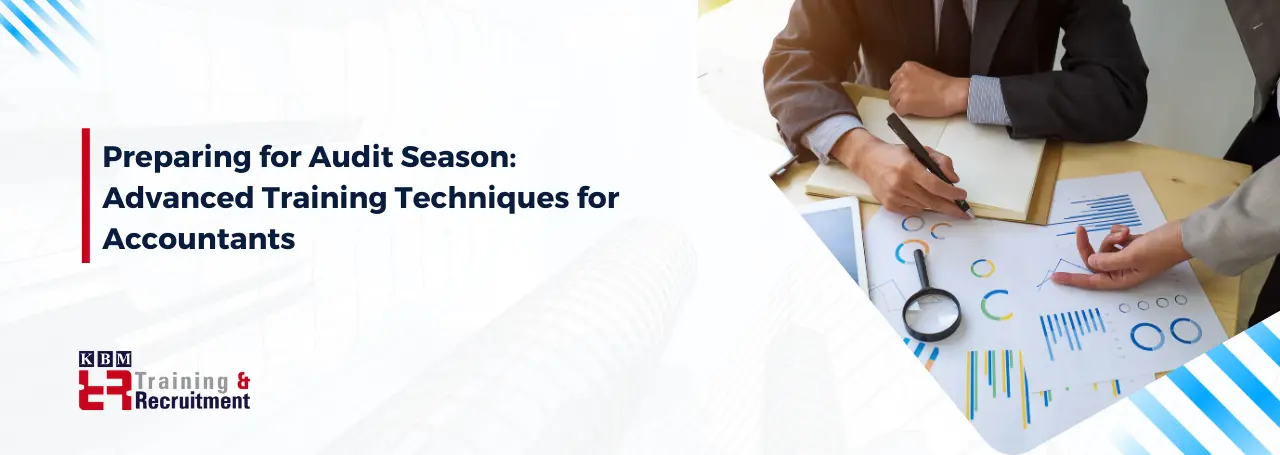Audit season – those two words evoke a mix of excitement and apprehension among accountants. It's a time when meticulous preparation, sharp analytical skills, and attention to detail are paramount. As organisations navigate increasingly complex regulatory landscapes and scrutiny from stakeholders, the demand for highly skilled auditors has never been greater.
In this blog, we'll explain advanced training techniques that can empower accountants to excel during audit season, ensuring compliance, accuracy, and confidence in their work.
Understanding the Audit Landscape
Before diving into training techniques, it's essential to grasp the dynamics of the audit landscape. Auditors are tasked with examining financial records, systems, and processes to ensure the accuracy and integrity of financial reporting. This requires a comprehensive understanding of accounting principles, auditing standards, and regulatory requirements, as well as the ability to adapt to ever-changing industry trends and best practices.
Continuous Learning: The Key to Success
In the fast-paced accounting world, continuous learning is not just a recommendation; it's a necessity. Advanced training techniques should encompass formal education, professional certifications, and hands-on experience.
Accountants should stay updated with the latest developments in accounting standards, auditing methodologies, and industry-specific regulations through seminars, workshops, webinars, and online courses offered by reputable organisations.
This commitment to continuous learning is not just about keeping up with the industry but about empowering yourself to excel in your role, be at the forefront of change, and inspire others with your dedication and knowledge.
Bridging Theory and Practice
One of the most effective ways to hone audit skills is through simulation exercises and case studies. These interactive learning experiences simulate real-world audit scenarios, allowing accountants to apply theoretical knowledge to practical situations.
By analysing financial statements, identifying potential risks, and devising audit procedures, participants can develop critical thinking skills and confidence in handling complex audit engagements.
Technology Integration
Audit software has become an essential tool for accountants in the era of digital transformation. Advanced training should include practical experience with leading audit software solutions such as ACL, TeamMate, or CaseWare, which automate routine tasks, boost data analysis capabilities, and enhance overall audit efficiency.
Accountants should familiarise themselves with features such as data analytics, sampling techniques, and workflow management to streamline audit processes and deliver high-quality results.
Soft Skills Development
While technical expertise is essential for auditors, soft skills are equally necessary for success in the field. Advanced training should focus on developing communication, interpersonal, and teamwork skills, as auditors often interact with clients, colleagues, and other stakeholders during the audit process.
Accountants should learn effective communication techniques, active listening, and conflict resolution strategies to build rapport, convey complex ideas, and navigate challenging situations professionally and diplomatically.
Ethical Considerations
Ethical conduct lies at the heart of the auditing profession. It's not just a requirement, but a responsibility that accountants must shoulder. Advanced training should emphasise the importance of integrity, objectivity, and independence in the audit process.
Accountants should be familiar with ethical standards outlined in professional codes of conduct, like those formed by the International Federation of Accountants (IFAC) and the American Institute of Certified Public Accountants (AICPA).
Training should include case studies and discussions on ethical dilemmas to foster ethical decision-making and reinforce the importance of upholding professional integrity. This emphasis on ethics is a testament to the trust and responsibility placed on accountants, making them feel valued and integral to the audit process.
Conclusion
Audit season presents challenges and opportunities for accountants to demonstrate their expertise and value to organisations. By embracing advanced training techniques, accountants can equip themselves with the knowledge, skills, and confidence needed to not just survive, but thrive during audit engagements.
This sense of accomplishment, of mastering the complexities of the audit landscape, is a reward in itself. From continuous learning and simulation exercises to technology integration and soft skills development, a holistic approach to training is essential for staying ahead in today's dynamic audit landscape.
As auditors strive for excellence, they must uphold ethical standards, foster collaboration, and leverage technology to deliver high-quality audits that inspire stakeholder trust and confidence. With the proper training and preparation, accountants can easily navigate audit season, ensuring compliance, accuracy, and integrity in their work.






















